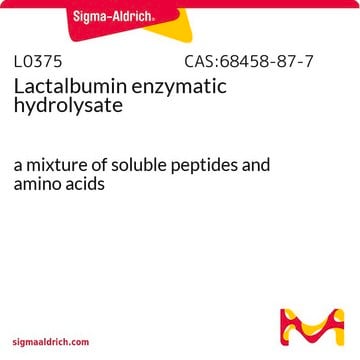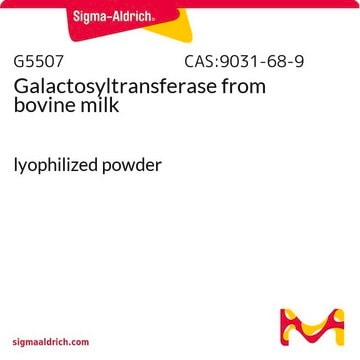L6010
α-Lactalbumin from bovine milk
Type III, calcium depleted, ≥85% (PAGE), lyophilized powder
Sinónimos:
Bos d 4, Lactose synthase B protein, alpha-lactalbumin
About This Item
Productos recomendados
origen biológico
bovine milk
tpo
Type III
Análisis
≥85% (PAGE)
formulario
lyophilized powder
calidad
calcium depleted
mol peso
14,178 Da by calculation
técnicas
indirect ELISA: suitable
solubilidad
H2O: soluble 10 mg/mL, clear to slightly hazy, colorless to faintly yellow
trazas de catión
Ca: ≤0.3 mol/mol
Nº de acceso UniProt
temp. de almacenamiento
−20°C
Información sobre el gen
cow ... LALBA(281894)
¿Está buscando productos similares? Visita Guía de comparación de productos
Categorías relacionadas
Descripción general
Aplicación
- in indirect enzyme-linked immunosorbent assay (ELISA) and competitive ELISA methods
- in binding of Hsp90 and HSJ1b analysis
- to inhibit the lysozyme CAP-RAST assay
Acciones bioquímicas o fisiológicas
Calidad
Código de clase de almacenamiento
11 - Combustible Solids
Clase de riesgo para el agua (WGK)
WGK 3
Punto de inflamabilidad (°F)
Not applicable
Punto de inflamabilidad (°C)
Not applicable
Equipo de protección personal
Eyeshields, Gloves, type N95 (US)
Certificados de análisis (COA)
Busque Certificados de análisis (COA) introduciendo el número de lote del producto. Los números de lote se encuentran en la etiqueta del producto después de las palabras «Lot» o «Batch»
¿Ya tiene este producto?
Encuentre la documentación para los productos que ha comprado recientemente en la Biblioteca de documentos.
Los clientes también vieron
Nuestro equipo de científicos tiene experiencia en todas las áreas de investigación: Ciencias de la vida, Ciencia de los materiales, Síntesis química, Cromatografía, Analítica y muchas otras.
Póngase en contacto con el Servicio técnico















